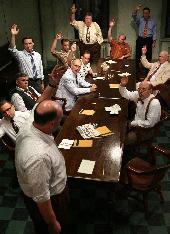SITE GUIDE
SEARCH
<>REVIEWS
FEATURES
NEWS
Etcetera and
Short Term Listings
LISTINGS
Broadway
Off-Broadway
NYC Restaurants
BOOKS and CDs
OTHER PLACES
Berkshires
London
California
New Jersey
DC
Philadelphia
Elsewhere
QUOTES
TKTS
PLAYWRIGHTS' ALBUMS
LETTERS TO EDITOR
FILM
LINKS
MISCELLANEOUS
Free Updates
Masthead
Writing for Us
A CurtainUp Los Angeles Review
Twelve Angry Men
|
I’m not really used to supposing. I’m a working man. My boss does the supposing.
— Juror Six
|

The Los Angeles cast of 12 Angry Men
(Photo: Joan Marcus) |
This jury, considering the fate of a teen-ager accused of murdering his abusive father which entails a mandatory death sentence, is presented with an apparently air-tight case based on a plausibly vindictive motive and the testimony of two witnesses. All but one are ready to call the boy guilty and go home. The hold-out is Juror Eight (Richard Thomas), an architect, who believes they should at least give him an hour’s discussion. The foreman, Juror One (George Wendt) polls the jury and gains a grudging acceptance.
The tight 90-minute no-intermission play is directed at breakneck pace with naturalistic overlapping dialogue by Scott Ellis, often at tiresomely screaming pitch by some of the jurors who have their own agendas. We get a few quiet moments when somebody goes to the bathroom and they’re welcome.
Among the most outraged are Juror Three (Randle Mell) who has major issues with his own teen-age son and hasn’t seen the rotten kid in two years and Juror Ten (Julian Gamble) who vents on the accused as one of "them", a minority group never identified and which may have changed over the last 50 years but it still relevant. Seniority gets its due in a wonderful performance by Alan Mandell, who enlightens the rest on the ability of an elderly witness, and is the brunt of brutally dismissive ageism by some of the jurors. The men themselves demonstrate the melting pot concept, if not racially, economically and professionally. There’s the comedian, the advertising executive, the house painter, the stock broker and others only dimly defined by dress and demeanor.
The play is a fine example of the Ellery Queen style of mystery writing, in which a crime is examined and analysed from all angles. Allen Moyer’s set is so realistic you can almost smell 1954 and the men, with their hats, suspenders, neckties inhabit it perfectly. The cast is consistently strong and powerfully engaged in the most complex conflict many of them have ever had. A closer look at evidence the boy’s court-appointed attorney didn’t question lends weight to Juror Eight’s emphasis on "reasonable doubt. " What this half-century old drama demonstrates most strongly is the ability of one man in a democracy to oppose the majority.
To read the review of the much extended Roundabout Theatre production on Broadway go here.
|
TWELVE ANGRY MEN Playwright: Reginald Rose Director: Scott Ellis Cast: Patrick New (Guard), George Wendt (Juror One), Todd Cerveris (Juror Two), Randle Mell (Juror Three), Jeffrey Hayenga (Juror Four), Jim Saltouros (Juror Five), Charles Borland (Juror Six), Mark Marettini (Juror Seven), Richard Thomas (Juror Eight), Alan Mandell (Juror Nine), Julian Gamble (Juror Ten), David Lively (Juror Eleven), T. Scott Cunningham (Juror Twelve), Robert Prosky (Voice of the Judge) Set Design: Allen Moyer Costume Design: Michael Krass Lighting Design: Paul Palazzo Sound Design: Brian Ronan Running Time: 90 minutes, no intermission Running Dates: March 28-May 6, 2007 Where: The Ahmanson Theatre, 135 N. Grand Avenue, Los Angeles, Reservations: (213) 628-4017. Reviewed by Laura Hitchcock on March 29. |

Easy-on-the budget super gift for yourself and your musical loving friends. Tons of gorgeous pictures.

Leonard Maltin's 2007 Movie Guide

At This Theater

 >
>

